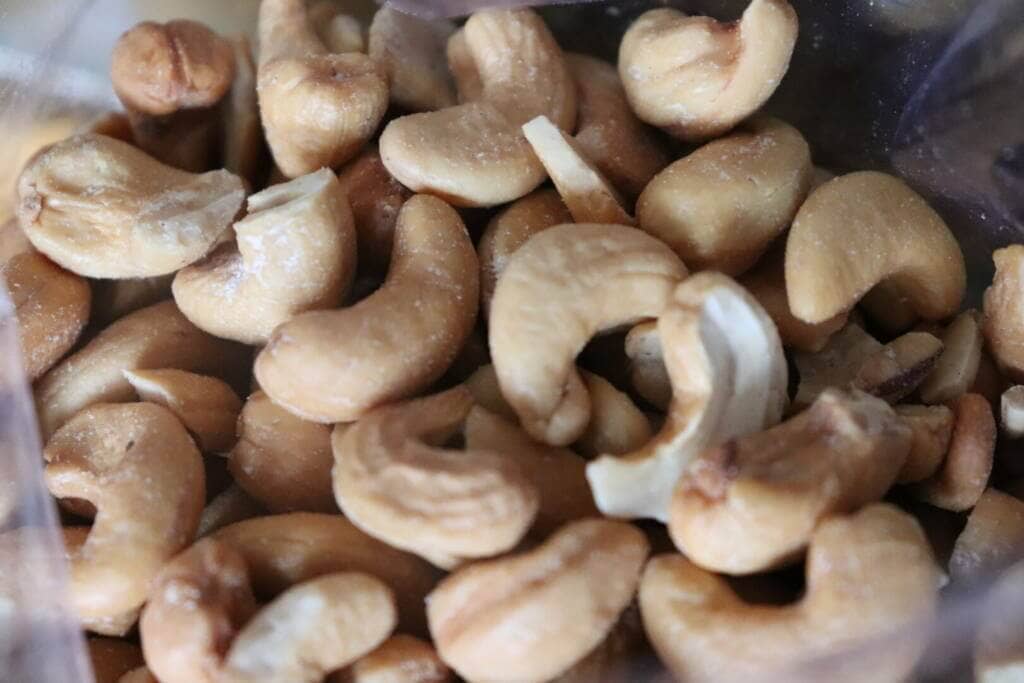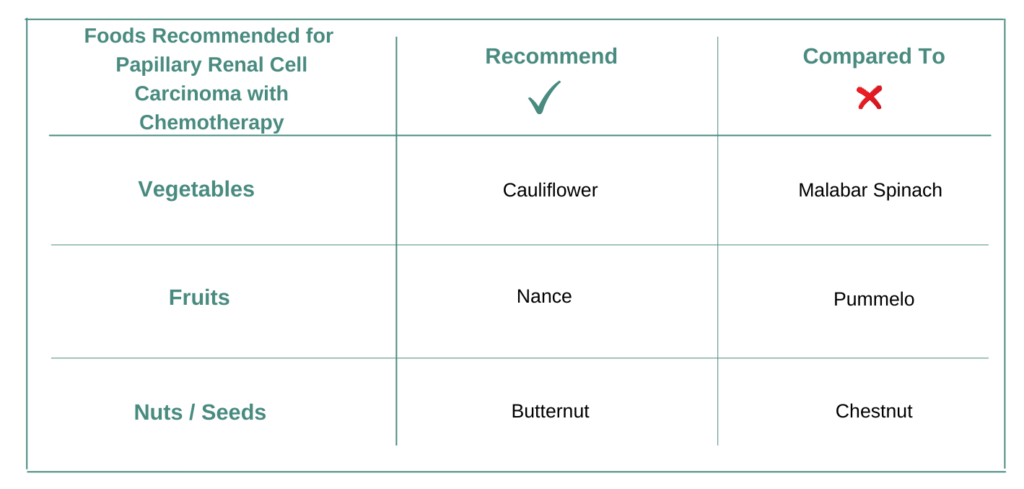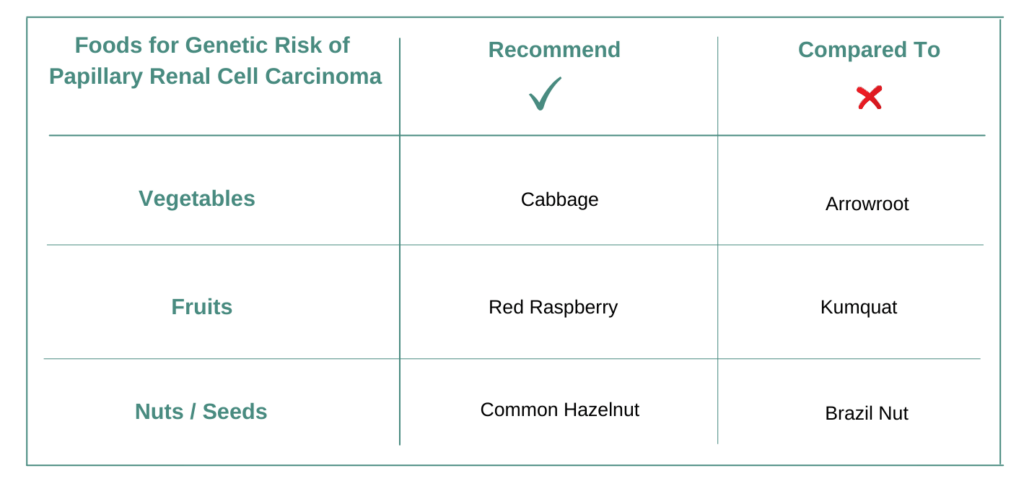Introduction
Foods for Papillary Renal Cell Carcinoma should be personalized for each individual and also must adapt when cancer treatment or tumor genetic change. The personalization and adaptation must consider all the active ingredients or bioactives contained in different foods with respect to cancer tissue biology, genetics, treatments, lifestyle conditions and diet preferences. Hence while nutrition is one of the very important decisions for a cancer patient and individual at risk of cancer to make – how to choose foods to eat is not an easy task.
Papillary renal cell carcinoma (PRCC) is a specific type of kidney cancer characterized by the growth of small, finger-like projections in the kidney. It is crucial to understand the pathology of papillary renal cell carcinoma, as outlined in detailed pathology outlines and radiology reports, to determine the best course of treatment. This type of cancer is classified into different types, primarily type 1 and type 2 papillary renal cell carcinoma, each with its unique pathology, prognosis, and treatment options. Type 2, especially, has distinct characteristics, including a different survival rate and pathology, as seen in papillary renal cell carcinoma type 2 pathology outlines and type 2 stage 4 cases.
The prognosis of papillary renal cell carcinoma varies based on factors like the cancer’s grade and stage, with survival rates being a key metric in assessing the disease’s progression. Treatment for papillary renal cell carcinoma generally involves surgical intervention, targeted therapies, and in some cases, immunotherapy. Immunohistochemistry (IHC) plays a significant role in the diagnosis and treatment planning, helping to identify specific markers like papillary renal cell carcinoma CK7 and psammoma bodies, which are characteristic features of this cancer.
Diagnosing papillary renal cell carcinoma involves a combination of clinical evaluation and imaging studies, as depicted in papillary renal cell carcinoma webpathology resources. Genetics also plays a role in the development of this cancer, with research ongoing in this area to better understand its implications. The ICD-10 coding for this condition is essential for healthcare documentation and insurance purposes. Symptoms of papillary renal cell carcinoma can vary, making early detection challenging. Awareness of these symptoms, along with regular check-ups, is vital for early intervention and effective management of the disease.
For Papillary Renal Cell Carcinoma does it matter what vegetables, fruits, nuts, seeds one eats?
A very common nutrition question asked by cancer patients and individuals at-genetic risk of cancer is – for cancers like Papillary Renal Cell Carcinoma does it matter what foods I eat and which I do not? Or if I follow a plant-based diet is that enough for cancer like Papillary Renal Cell Carcinoma?
For example does it matter if vegetable Cauliflower is consumed more compared to Malabar Spinach? Does it make any difference if fruit Pummelo is preferred over Nance? Also if similar choices are made for nuts/seeds like Butternut over Chestnut and for pulses like Adzuki Bean over Common Bean. And if what I eat matters – then how does one identify foods which are recommended for Papillary Renal Cell Carcinoma and is it the same answer for everyone with the same diagnosis or genetic risk?
Yes! Foods you eat matters for Papillary Renal Cell Carcinoma!
Food recommendations may not be the same for everyone and can be different even for the same diagnosis and genetic risk.

All foods (vegetables, fruits, nuts, seeds, pulses, oils etc.) and nutritional supplements are made up of more than one active molecular ingredient or bio-actives in different proportions and quantities. Each active ingredient has a unique mechanism of action – which can be activation or inhibition of different biochemical pathways. Simply stated foods and supplements which are recommended are those which do not cause an increase of molecular drivers of cancer but reduce them. Else those foods should not be recommended. Foods contain multiple active ingredients – hence when evaluating foods and supplements you need to consider the impact of all active ingredients cumulatively rather than individually.
For example Pummelo contains active ingredients Quercetin, Curcumin, Formononetin, Caffeine, Isoliquiritigenin. And Nance contains active ingredients Curcumin, Formononetin, Caffeine, Isoliquiritigenin, Cinnamaldehyde and possibly others.
A common mistake made when deciding and choosing foods to eat for Papillary Renal Cell Carcinoma – is to evaluate only selected active ingredients contained in foods and ignore the rest. Because different active ingredients contained in foods may have opposing effects on cancer drivers – you cannot cherry pick active ingredients in foods and supplements for making a nutrition decision for Papillary Renal Cell Carcinoma.
YES – FOOD CHOICES MATTER FOR CANCER. NUTRITION DECISIONS MUST CONSIDER ALL ACTIVE INGREDIENTS OF FOODS.
Skills Needed for Nutrition Personalization for Papillary Renal Cell Carcinoma?
Personalized nutrition for cancers like Papillary Renal Cell Carcinoma consists of recommended foods / supplements; not recommended foods / supplements with example recipes which prioritize use of recommended foods. An example of personalized nutrition can be seen at this link.
Deciding which foods are recommended or not is extremely complicated, requiring expertise in Papillary Renal Cell Carcinoma biology, food science, genetics, biochemistry along with good understanding of how cancer treatments work and associated vulnerabilities by which the treatments could stop being effective.
MINIMUM KNOWLEDGE EXPERTISE NEEDED FOR NUTRITION PERSONALIZATION FOR CANCER ARE: CANCER BIOLOGY, FOOD SCIENCE, CANCER TREATMENTS AND GENETICS.
Foods to Eat After Cancer Diagnosis!
No two cancers are the same. Go beyond the common nutrition guidelines for everyone and make personalized decisions about food and supplements with confidence.
Characteristics of cancers like Papillary Renal Cell Carcinoma
All cancers like Papillary Renal Cell Carcinoma can be characterized by a unique set of biochemical pathways – the signature pathways of Papillary Renal Cell Carcinoma. Biochemical pathways like Oncogenic Cancer Epigenetics, Suppressive Histone Methylation, Small Molecule Transport, Focal Adhesion are part of the signature definition of Papillary Renal Cell Carcinoma. Each individual’s cancer genetics can be different and hence their specific cancer signature could be unique.
The treatments which are effective for Papillary Renal Cell Carcinoma need to be cognizant of the associated signature biochemical pathways for each cancer patient and individual at genetic risk. Therefore different treatments with different mechanisms of actions are effective for different patients. Similarly and for the same reasons foods and supplements need to be personalized for each individual. Hence some foods and supplements are recommended for Papillary Renal Cell Carcinoma when taking cancer treatment Pembrolizumab, and some foods and supplements are not recommended.
Sources like cBioPortal and many others provide population representative patient anonymized data from clinical trials for all cancer indications. This data consists of clinical trial study details like sample size / number of patients, age groups, gender, ethnicity, treatments, tumor site and any genetic mutations.
BIRC6, PLEC, DYNC1H1, FASN and CENPE are the top ranked reported genes for Papillary Renal Cell Carcinoma. BIRC6 is reported in 2.7 % of the representative patients across all clinical trials. And PLEC is reported in 2.1 %. The combined population patient data cover ages from 3 to 88. 73.0 % of the patient data are identified as men. The Papillary Renal Cell Carcinoma biology along with reported genetics together define the population represented signature biochemical pathways for this cancer. If the individual cancer tumor genetics or genes contributing to the risk are also known then that should also be used for nutrition personalization.
NUTRITION CHOICES SHOULD MATCH WITH EACH INDIVIDUAL’S CANCER SIGNATURE.
Failed to connect to MySQL: No route to hostFood and Supplements for Papillary Renal Cell Carcinoma
For Cancer Patients
Cancer patients on treatment or on palliative care need to make decisions on food and supplements – for the needed dietary calories, for managing any treatment side effects and also for improved cancer management. All plant-based foods are not equal and choosing and prioritizing foods which are personalized and customized to ongoing cancer treatment is important and complicated. Here are some examples providing guidelines for making nutrition decisions.
Choose Vegetable CAULIFLOWER or MALABAR SPINACH?
Vegetable Cauliflower contains many active ingredients or bioactives such as Curcumin, Formononetin, Isoliquiritigenin, Cinnamaldehyde, Brassinin. These active ingredients manipulate various biochemical pathways like Interferon Signaling, PPAR Signaling, Macrophage M2 and MYC Signaling and others. Cauliflower is recommended for Papillary Renal Cell Carcinoma when ongoing cancer treatment is Pembrolizumab. This is because Cauliflower modifies those biochemical pathways which have been scientifically reported to sensitize the effect of Pembrolizumab.
Some of the active ingredients or bioactives in vegetable Malabar Spinach are Quercetin, Curcumin, Formononetin, Caffeine, Isoliquiritigenin. These active ingredients manipulate various biochemical pathways like Interferon Signaling, Amino Acid Metabolism, WNT Beta Catenin Signaling and G-protein-coupled Receptor Signaling and others. Malabar Spinach is not recommended for Papillary Renal Cell Carcinoma when ongoing cancer treatment is Pembrolizumab because it modifies those biochemical pathways which make the cancer treatment resistant or less responsive.
VEGETABLE CAULIFLOWER IS RECOMMENDED OVER MALABAR SPINACH FOR Papillary Renal Cell Carcinoma AND TREATMENT Pembrolizumab.
Choose Fruit NANCE or PUMMELO?
Fruit Nance contains many active ingredients or bioactives such as Curcumin, Formononetin, Caffeine, Isoliquiritigenin, Cinnamaldehyde. These active ingredients manipulate various biochemical pathways like DNA Repair, Macrophage M2, Angiogenesis and Interferon Signaling and others. Nance is recommended for Papillary Renal Cell Carcinoma when ongoing cancer treatment is Pembrolizumab. This is because Nance modifies those biochemical pathways which have been scientifically reported to sensitize the effect of Pembrolizumab.
Some of the active ingredients or bioactives in fruit Pummelo are Quercetin, Curcumin, Formononetin, Caffeine, Isoliquiritigenin. These active ingredients manipulate various biochemical pathways like Interferon Signaling, PPAR Signaling and Macrophage M2 and others. Pummelo is not recommended for Papillary Renal Cell Carcinoma when ongoing cancer treatment is Pembrolizumab because it modifies those biochemical pathways which make the cancer treatment resistant or less responsive.
FRUIT NANCE IS RECOMMENDED OVER PUMMELO FOR Papillary Renal Cell Carcinoma AND TREATMENT Pembrolizumab.
Choose Nut BUTTERNUT or CHESTNUT?
Butternut contains many active ingredients or bioactives such as Curcumin, Formononetin, Caffeine, Isoliquiritigenin, Cinnamaldehyde. These active ingredients manipulate various biochemical pathways like DNA Repair, Angiogenesis, Interferon Signaling and MYC Signaling and others. Butternut is recommended for Papillary Renal Cell Carcinoma when ongoing cancer treatment is Pembrolizumab. This is because Butternut modifies those biochemical pathways which have been scientifically reported to sensitize the effect of Pembrolizumab.
Some of the active ingredients or bioactives in Chestnut are Curcumin, Ellagic Acid, Formononetin, Caffeine, Isoliquiritigenin. These active ingredients manipulate various biochemical pathways like PPAR Signaling, WNT Beta Catenin Signaling and G-protein-coupled Receptor Signaling and others. Chestnut is not recommended for Papillary Renal Cell Carcinoma when ongoing cancer treatment is Pembrolizumab because it modifies those biochemical pathways which make the cancer treatment resistant or less responsive.
BUTTERNUT IS RECOMMENDED OVER CHESTNUT FOR Papillary Renal Cell Carcinoma AND TREATMENT Pembrolizumab.

For Individuals with Genetic Risk of Cancer
The question asked by individuals who have genetic risk of Papillary Renal Cell Carcinoma or familial history is “What Should I Eat Differently from Before?” and how they should choose foods and supplements to manage risks of the disease. Since for cancer risk there is nothing actionable in terms of treatment – decisions of foods and supplements become important and one of the very few actionable things which can be done. All plant-based foods are not equal and based on identified genetics and pathway signature – the choices of food and supplements should be personalized.
Choose Vegetable CABBAGE or ARROWROOT?
Vegetable Cabbage contains many active ingredients or bioactives such as Apigenin, Curcumin, Daidzein, Lupeol, Formononetin. These active ingredients manipulate various biochemical pathways like Apoptosis, RAS-RAF Signaling, P53 Signaling and MYC Signaling and others. Cabbage is recommended for risk of Papillary Renal Cell Carcinoma when associated genetic risk is BIRC6. This is because Cabbage increases those biochemical pathways which counteract the signature drivers of it.
Some of the active ingredients or bioactives in vegetable Arrowroot are Apigenin, Curcumin, Daidzein, Lupeol, Formononetin. These active ingredients manipulate various biochemical pathways like Extracellular Matrix Remodelling, Small Molecule Transport and Cell Cycle Checkpoints and others. Arrowroot is not recommended when risk of Papillary Renal Cell Carcinoma when associated genetic risk is BIRC6 because it increases the signature pathways of it.
VEGETABLE CABBAGE IS RECOMMENDED OVER ARROWROOT FOR BIRC6 GENETIC RISK OF CANCER.
Choose Fruit RED RASPBERRY or KUMQUAT?
Fruit Red Raspberry contains many active ingredients or bioactives such as Curcumin, Ellagic Acid, Daidzein, Lupeol, Formononetin. These active ingredients manipulate various biochemical pathways like P53 Signaling, Focal Adhesion, Small Molecule Transport and MYC Signaling and others. Red Raspberry is recommended for risk of Papillary Renal Cell Carcinoma when associated genetic risk is BIRC6. This is because Red Raspberry increases those biochemical pathways which counteract the signature drivers of it.
Some of the active ingredients or bioactives in fruit Kumquat are Apigenin, Curcumin, Daidzein, Lupeol, Formononetin. These active ingredients manipulate various biochemical pathways like Focal Adhesion and Small Molecule Transport and others. Kumquat is not recommended when risk of Papillary Renal Cell Carcinoma when associated genetic risk is BIRC6 because it increases the signature pathways of it.
FRUIT RED RASPBERRY IS RECOMMENDED OVER KUMQUAT FOR BIRC6 GENETIC RISK OF CANCER.
Choose Nut COMMON HAZELNUT or BRAZIL NUT?
Common Hazelnut contains many active ingredients or bioactives such as Curcumin, Daidzein, Lupeol, Formononetin, Quercetin. These active ingredients manipulate various biochemical pathways like Apoptosis, P53 Signaling, Focal Adhesion and Cell Cycle Checkpoints and others. Common Hazelnut is recommended for risk of Papillary Renal Cell Carcinoma when associated genetic risk is BIRC6. This is because Common Hazelnut increases those biochemical pathways which counteract the signature drivers of it.
Some of the active ingredients or bioactives in Brazil Nut are Curcumin, Ellagic Acid, Daidzein, Lupeol, Formononetin. These active ingredients manipulate various biochemical pathways like Small Molecule Transport, PI3K-AKT-MTOR Signaling and MYC Signaling and others. Brazil Nut is not recommended when risk of Papillary Renal Cell Carcinoma when associated genetic risk is BIRC6 because it increases the signature pathways of it.
COMMON HAZELNUT IS RECOMMENDED OVER BRAZIL NUT FOR BIRC6 GENETIC RISK OF CANCER.

In Conclusion
Foods and Supplements chosen are important decisions for cancers like Papillary Renal Cell Carcinoma. Papillary Renal Cell Carcinoma patients and individuals with genetic-risk always have this question: “What foods and nutritional supplements are recommended for me and which are not?” There is a common belief which is a misconception that all plant-based foods could be beneficial or not but would not be harmful. Certain foods and supplements can interfere with cancer treatments or promote molecular pathway drivers of cancer.
There are different types of cancer indications like Papillary Renal Cell Carcinoma, each with different tumor genetics with further genomic variations across each individual. Further every cancer treatment and chemotherapy has a unique mechanism of action. Each food like Cauliflower contains various bioactives in different quantities, which have an impact on different and distinct sets of biochemical pathways. The definition of personalized nutrition is individualized food recommendations for the cancer indication, treatments, genetics, lifestyle and other factors. Nutrition personalization decisions for cancer require knowledge of cancer biology, food science and an understanding of different chemotherapy treatments. Finally when there are treatment changes or new genomics is identified – the nutrition personalization needs re-evaluation.
The addon nutrition personalization solution makes the decision making easy and removes all the guesswork in answering the question, “What foods should I choose or not choose for Papillary Renal Cell Carcinoma?”. The addon multi-disciplinary team includes cancer physicians, clinical scientists, software engineers and data scientists.
Personalized Nutrition for Cancer!
Cancer changes with time. Customize and modify your nutrition based on cancer indication, treatments, lifestyle, food preferences, allergies and other factors.
References
- Msk Ch 2020
- Pan-cancer analysis of whole genomes.
- Dietary D-glucarate effects on the biomarkers of inflammation during early post-initiation stages of benzo[a]pyrene-induced lung tumorigenesis in A/J mice.
- Vitamin C enhances epigenetic modifications induced by 5-azacytidine and cell cycle arrest in the hepatocellular carcinoma cell lines HLE and Huh7.
- Brassinin inhibits STAT3 signaling pathway through modulation of PIAS-3 and SOCS-3 expression and sensitizes human lung cancer xenograft in nude mice to paclitaxel.
- Effects and significance of formononetin on expression levels of HIF-1α and VEGF in mouse cervical cancer tissue.
- Estrogen receptor modulators genistein, daidzein and ERB-041 inhibit cell migration, invasion, proliferation and sphere formation via modulation of FAK and PI3K/AKT signaling in ovarian cancer.
